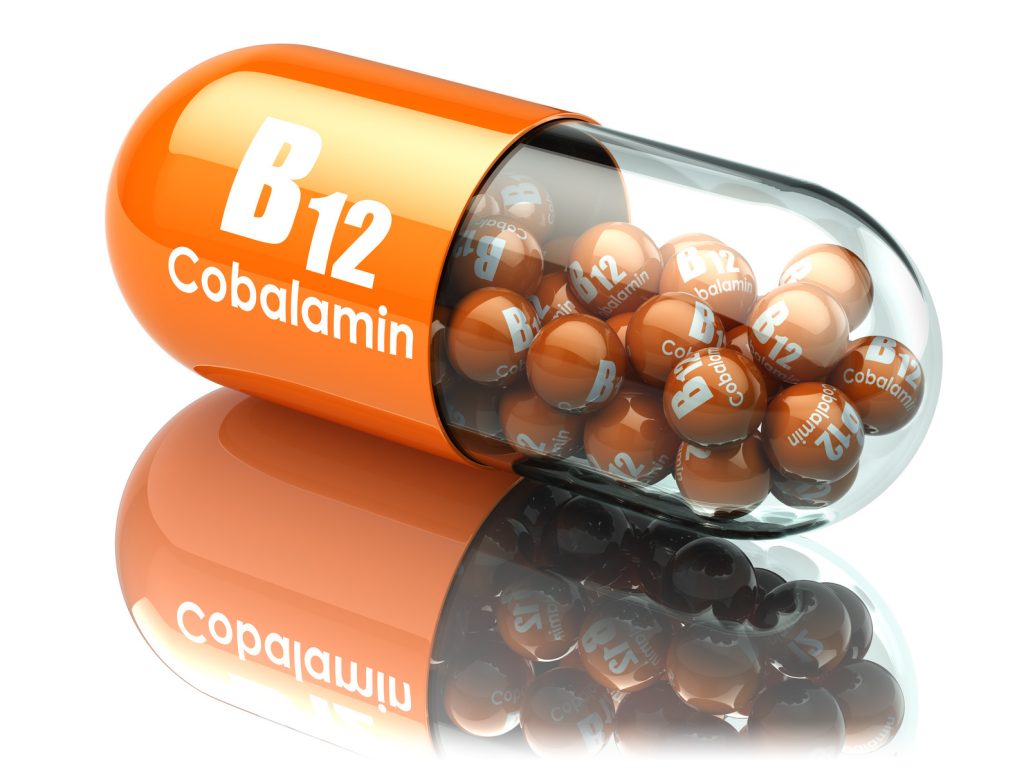
No, B12 isn’t a boy band from the 90’s.
But could you imagine that: N-SYNC, but with 12 members?
*shudder*
B12 is a vitamin. And not just any vitamin, but a B vitamin! And anyone familiar with B vitamins knows that B vitamins are optimal for defeating fatigue and frowns, two of my least favorite things–next to dog bites and bee stings. However, if I’m being partial (who isn’t at least a little partial, eh?), then I’d have to call Vitamin B6 my favorite B vitamin.
In fact, B6 is the true nootropic of the B vitamin family.
Yet, B12 still has its advantages for brain health, many of which allow us to have a brain at all… and we’re going to get into it in this nootropic review.
Page Contents
How Vitamin B12 Is Supposed to Work
Do you ever wake up with a major hankering for cobalt?
![By Alchemist-hp (talk) (www.pse-mendelejew.de) (Own work) [FAL], via Wikimedia Commons](https://nootropicgeek.com/wp-content/uploads/2016/11/cobalt-300x200.jpg)
Well, I hope you answered Yes, because without it you’d be a nerveless mess.
Vitamin B12 has cobalt, because its a cobalamin, a water-soluble, cobalt-containing vitamin that’s integral to the functioning of the nervous system, as well as the formation of blood cells. Cobalt, as a part of B12, helps prevent anemia (particularly pernicious anemia), fatigue, GI disorders, and neuronal issues. Which is why B12-deficiency has a strong association with anemia and neurocognitive disorders.
And B12 supplementation has an association with… not anemia and neurocognitive disorders…
…

In other news: Water is wet!
But does protection against anemia and neurocognitive disorders necessarily qualify as nootropic action? After all, water protects against dehydration, which affects cognition, but I don’t rank water as a cognitive enhancer.
As such, looking at B12 as a nootropic is a tough sell. Without it you’ll surely experience cognitive disruption, but with it you’ll simply experience… cognition. Yet, there are certain demographics that do benefit from supplementing the vitamin:
Who Needs B12 Supplementation?
While B12 intake generally seems to be above the recommended daily dosage, the incidence of B12-deficiency, primarily among elderly folks in Western countries, is approximately 20%.
The main cause: Malabsorption.
Later in life, the body becomes less efficient at absorbing natural B12 sources, making B12 supplementation increasingly necessary over time. Conversely, men and women who opt for the vegan and vegetarian lifestyle simply don’t receive enough B12 in their B12-deficient diets, and may require B12 supplementation to compensate.
Supplementation of B12 is often coupled with folic acid (vitamin B9), the combination believed to have synergistic benefits on the following bio-effects:
Supports gene expression of neural tissue
Ever heard of S-adenosylmethionine (SAMe), the compound required for the chemical reactions included in methylation, synthesis, and repair of DNA? Oh, you have?? Well, did you know that Vitamin B12 is involved in the formation of SAMe?
HA! Didn’t think so. No one outsmarts The Geek.
Improves neural connectivity
![Check out this neuron just, like... being a neuron. By LadyofHats [Public domain], via Wikimedia Commons](https://nootropicgeek.com/wp-content/uploads/2016/11/neuron-cell-diagram-1024x745.png)
Preserves cell membrane structure
Cell membranes use methyl groups to convert phosphatidylethanolamine to phosphatidylcholine, which helps mobilize DHA omega-3 fats from the liver to brain cells.
And B12 supplies methyl groups for the conversion.
The observation that DHA mobilization from the liver, through the plasma, into the brain decreased in older age, in addition to an increased level of homocysteine (which can be reduced by Vitamin B6), might suggest of B12’s ability to preserve brain cell membrane and, consequently, cognition for ze older folks.
Intermission: Girl, You Need A Shot of B-12
Maybe B-12 is a ’90s boy band after all??
Vitamin B12 Benefits
One of B12’s popular monikers: “Energy vitamin.”
However, as I suggested earlier, this isn’t because B12 supplies energy. Rather, it prevents the opposite of energy: weakness, fatigue, cognitive impairment–conditions associated with B12-deficiency. As such, B12’s benefits are typically felt by the two demographics mentioned above: Elderly and vegans/vegetarians. Anyone outside of these groups might feel increased energized thinking, but the benefits seem more pronounced for people at risk of B12-deficiency.
Which B12 is Best for Brain Health?
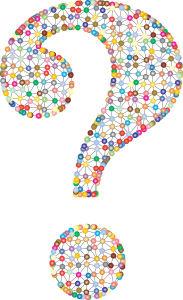 The best B12 found in commercial supplement stacks: Methylcobalamin.
The best B12 found in commercial supplement stacks: Methylcobalamin.
Because this is the most active B12 form in the body, it’s the most bio-active B12 supplement–plus its ability to cross the blood-brain barrier and its supply of methyl molecules provide extra advantages for brain health.
The cheaper commercial B12 form is Cyanocobalamin, which is cheap, lab-synthesized B12 bound to cyanide. Due to the cyanide-bond, Cyanocobalamin is the most stable B12 form, but less bio-active as the body has to remove the bond to reap cobalamin’s benefits.
Other B12 forms: Hydroxocobalamin and Adenosylcobalamin–the former being the most common B12 type in food, and the latter being the least stable B12 and, thus, the rarest cobalamin.
Researchers Have Suggested Vitamin B12 Might:
Help facilitate brain development and functioning (in rats)
I’ll start with a promising rat study that observed the effects of B12 supplementation on brain development and functioning during pregnancy. After dividing a group of pregnant rats into 3 groups: 1) Control, 2) B12 Supplementation, 3) B12 + Omega-3 Supplementation–the researchers recorded brain BDNF and DHA levels in pups at birth to determine the importance of B12 on brain development. The findings: “omega-3 fatty acid and vitamin B12 enriched diet may exert beneficial effects on synaptic plasticity and cognition, which may prove beneficial for mental health, particularly in preventing neurocognitive disorders.”
Help With cognitive decline in mild cognitive impairment (MCI) patients
In this study, B12 (combined with B6 + folic acid) or placebo was administered to 266 MCI patients every day for 2 years straight. In the B vitamins group, homocysteine (which impairs cerebral bloodflow) was reduced by 30% when compared to placebo, and executive function and episodic/semantic memory also improved. Additionally, dementia rating scores were improved in patients who had initially high homocysteine levels.
Mark cognitive health among older individuals and people with autism or schizophrenia
Post-mortem brain samples of 12 autistic subjects and 9 schizophrenic subjects were analyzed for B12 vitamin levels and compared with 43 subjects of various ages, who served as a control. Of this control group, B12 levels were significantly lower in subjects aged 60 years or older. On the other hand, the autistic and schizophrenic samples were found to have B12 levels that were three times lower than their age-matched controls.
Fail to improve cognitive function under mild B12-deficient conditions
![Folic acid crystals. By W. Oelen [CC BY-SA 3.0], via Wikimedia Commons](https://nootropicgeek.com/wp-content/uploads/2016/11/Folic_acid_crystals-225x300.jpg)
- Placebo
- 1000 mcg B12
- 1000 mcg B12 + 400 mcg folic acid
After a span of 24 weeks, the subjects were tested for vitamin levels and cognitive function. The researchers observed that B12 supplemented corrected B12-deficiency, while folic acid increased folic acid concentrations and decreased homocysteine levels by 36%. However, neither vitamin seemed to have any effect on cognitive function following conditions of mild B12-deficiency.
How to Take Vitamin B12
- Most B12 studies on brain health administer doses of 1000 mcg B12, often with 400 mcg folic acid. Take note: We’re talking micrograms, not milligrams!
- Standalone B12 supplements widely range between 500 – 6000 mcg dosages.
- The daily recommended B12 intake is low, ranging from 1.4 to 3.0 mcg daily.
My Experience with Vitamin B12
My experience with Vitamin B12 should be taken with a grain of salt.
For one: I am not B12-deficient.
For two: Rarely, do I supplement B12 on its own.
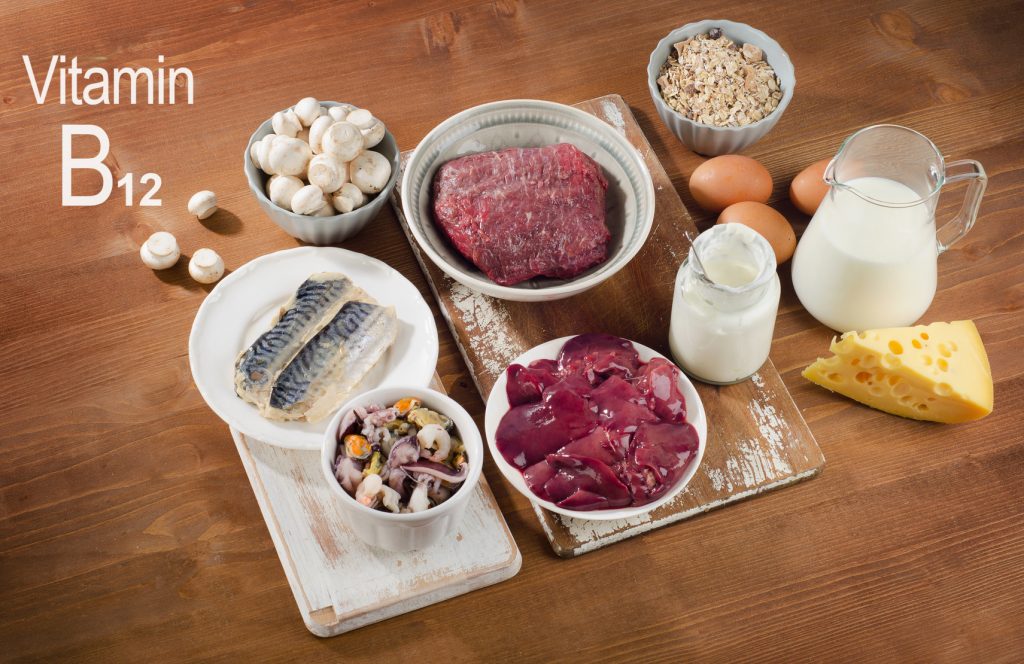
Even in vitamin research, it’s relatively hard to find B12 studies that don’t somehow incorporate other B vitamins into their experiment models. However, I’m confident we have enough valid research to identify the bio-mechanics and benefits of B12.
Yet, I am not yet elderly (despite being wise far beyond my years) and I consume adequate amounts of dietary B12. So you can say my experience with Vitamin B12 is summed up by my daily ability to think.
This isn’t to say that I felt nothing after attempting significant doses of cobalamin. B12, as an “energy vitamin,” is commonly found in “energizing” supplement stacks, many of which accomplish what they claim to do: Increase energy and focus.
In this format, B12 and company do seem to energize my mindpower, cognition, and concentration. The problem is: It’s hard to determine how much of a role B12 plays in this. After all, B12 is commonly stacked with B6, which also increases energy and mood, and that, frankly, I have more confidence in as a true nootropic–one that doesn’t require initial states of vitamin deficiency to be felt.
With that in mind, I like the idea of supplementing complete B Vitamin complexes more so than standalone B12. Not only does this seem to round out all the edges on B Vitamin-related cognition, but it accomplishes the potential synergy between B12 and other B vitamins.
For both the old and young, vegans and meat-eaters, this seems to be the way to go re: B12.
Is Vitamin B12 a Good Nootropic?
Vitamin B12 is an ESSENTIAL brain nutrient.
But is it a nootropic?
More importantly, does it concern you that I’m still asking this at the article’s end?
If you’re eating correctly, consuming a well-rounded, vitamin-filled diet, then you’re like consuming enough B12, in which case: No, B12 supplementation won’t do much for you as a nootropic.
But if you’re in the elderly camp, or vegan camp, or any camp that somehow bars B12 from reaching your nervous system, then: Yes, B12 supplement will make a difference on cognition.
Even so, take B12 for brain health, not for immediate boosts in cognition. The “energy” provided by this “energy vitamin” is natural energy produced by a healthy brain. If you feel your energy is off, then your brain health might be off.
In which case, B12 might be a good move.
Best Nootropic Supplements with Vitamin B12
Odds are, if you’re in B12-deficiency territory, you’ll want a standalone B12 vitamin supplement — or at least a quality B vitamin complex — to restore your B12 levels. However, the same might be accomplished (and then some) with a quality nootropic stack that supplies B12 in addition to other smartly chosen cognitive enhancers. Although, you don’t want just any ol’ nootropic stack, just as you don’t want just any ol’ B vitamin. Here are some of the best nootropic supplements with vitamin B12:
Mind Lab Pro
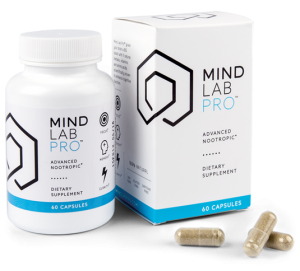 Mind Lab Pro is by no means a multivitamin supplement — nor even a nootropic multivitamin hybrid — yet, it supplies one of the best (albeit simple) B vitamin complexes in the nootropic game with its BioGenesis™ brand of:
Mind Lab Pro is by no means a multivitamin supplement — nor even a nootropic multivitamin hybrid — yet, it supplies one of the best (albeit simple) B vitamin complexes in the nootropic game with its BioGenesis™ brand of:
- Vitamin B6 – 2.5 mg (125% DV)
- Vitamin B9 – 100 mcg (25% DV)
- Vitamin B12 – 7.5 mcg (125% DV)
For the average, healthy nootropic enthusiast, Mind Lab Pro’s B12 content works for stable, effective, daily replenishment. Accompanied by vitamins B6 and B9, Mind Lab Pro’s B12 may help co-facilitate various brain chemical pathways, including those involved in MLP’s N-Acetyl L-Tyrosine‘s conversion to catecholamine neurotransmitters.
Admittedly, I’m more a fan of Mind Lab Pro’s other non-vitamin ingredients than of its B vitamins …but even so: Mind Lab Pro’s B vitamins are impressive.
Read my in-depth review on Mind Lab Pro.
Qualia Mind
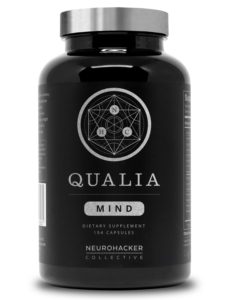 I admit the same for Qualia Mind: I’m more a fan of this superstack’s 23 other ingredients than of its B vitamins. However, what’s particularly impressive about Qualia Mind’s B vitamin content is how many B vitamins Qualia Mind manages to pack into its capsules despite the large number of other nootropics in this formula.
I admit the same for Qualia Mind: I’m more a fan of this superstack’s 23 other ingredients than of its B vitamins. However, what’s particularly impressive about Qualia Mind’s B vitamin content is how many B vitamins Qualia Mind manages to pack into its capsules despite the large number of other nootropics in this formula.
Altogether, Qualia Mind supplies five B vitamins: B1 (as Benfotiamine), B3 (as Niacinimide), B5 (as Calcium Pantothenate), B6 (as Pyridoxal 5 Phosphate), and B12 (as Methylcobalamin) — all in their preferred, bioavailable forms, all at more than adequate dosages. And, as I already suggested, this is in addition to 23 other ingredients, stacking up to a total of (where my math whizzes at??) 28 ingredients.
I know what you’re thinking: 28 ingredients are way too many for a capsule supplement to work. Fortunately, Qualia Mind calls for 7 vegetarian capsule serving sizes, creating enough room for all of its nootropics work. (Of course, this many high quality ingredients comes at a hefty price, so prep thy wallets.)
Read my in-depth review on Qualia Mind.
Genius Joy
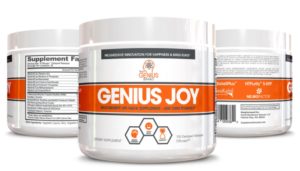 Qualia Mind gives us five different B vitamins, whereas Genius Joy supplies six: B1 (as Thiamine HCl), B2 (as Riboflavin-5′-Phosphate), B3 (as Niacinimide), B5 (as D-Calcium Pantothenate), B6 (as Pyridoxal-5′-Phosphate), and B12 (as Methylcobalamin) — again, each in their preferred, bio-active forms, each sufficiently dosed.
Qualia Mind gives us five different B vitamins, whereas Genius Joy supplies six: B1 (as Thiamine HCl), B2 (as Riboflavin-5′-Phosphate), B3 (as Niacinimide), B5 (as D-Calcium Pantothenate), B6 (as Pyridoxal-5′-Phosphate), and B12 (as Methylcobalamin) — again, each in their preferred, bio-active forms, each sufficiently dosed.
Or at least dosed high enough for a 100% DV across the B vitamin board. Not the best by nootropic cognitive enhancement standards but solid for daily replenishment and mood stabilization.
Which is essentially what Genius Joy was designed for: better mood and stress relief. By stacking mood-related brain chemical precursors — NALT, SAMe, and 5-HTP — with co-facilitating B vitamins, Genius Joy covers a wide spectrum of neurochemical mood balance. (Also, it supplies a unique brand of Rhodiola as Rhodiola5Plus®, which I haven’t seen before this stack.)
Read my in-depth review on Genius Joy.
Brain Lift (f.k.a. Study Juice)
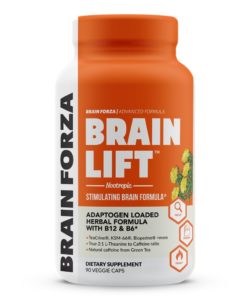 Before reviewing Genius Joy, I considered Brain Lift, formerly known as Study Juice, as the premier dopaminergic “joy” booster — albeit caffeinated “joy” booster. Even aside from Genius Joy’s well-crafted mood boosting formula, Brian Lift still impresses with its hardy mix of herbal adaptogen extracts, natural caffeine content, and (you guessed it) B vitamins, namely: B6 (as P-5-P) and B12 (as Methylcobalamin).
Before reviewing Genius Joy, I considered Brain Lift, formerly known as Study Juice, as the premier dopaminergic “joy” booster — albeit caffeinated “joy” booster. Even aside from Genius Joy’s well-crafted mood boosting formula, Brian Lift still impresses with its hardy mix of herbal adaptogen extracts, natural caffeine content, and (you guessed it) B vitamins, namely: B6 (as P-5-P) and B12 (as Methylcobalamin).
Not exactly the most diverse B vitamin complex, yet Brain Lift supplies both B vitamins (admittedly, my two favorite B vitamins) at sizable enough dosages for nootropic results.
And, as I already mentioned, these B vitamins accompany a diverse assortment of herbal extracts (e.g., Rhodiola rosea, Schisandra chinensis) and clean caffeine (sourced from green tea and guarana) that’s paired with caffeine-like theacrine.
It’s essentially a git-up-and-go mix of cognitive enhancement and dopaminergic mood and focus boosts, perfect for the strained academic and …well, strained non-academic.
Read my in-depth review on Brain Lift.
Overall Vitamin B12 Nootropic Power Rating
[yasr_multiset setid=0]
